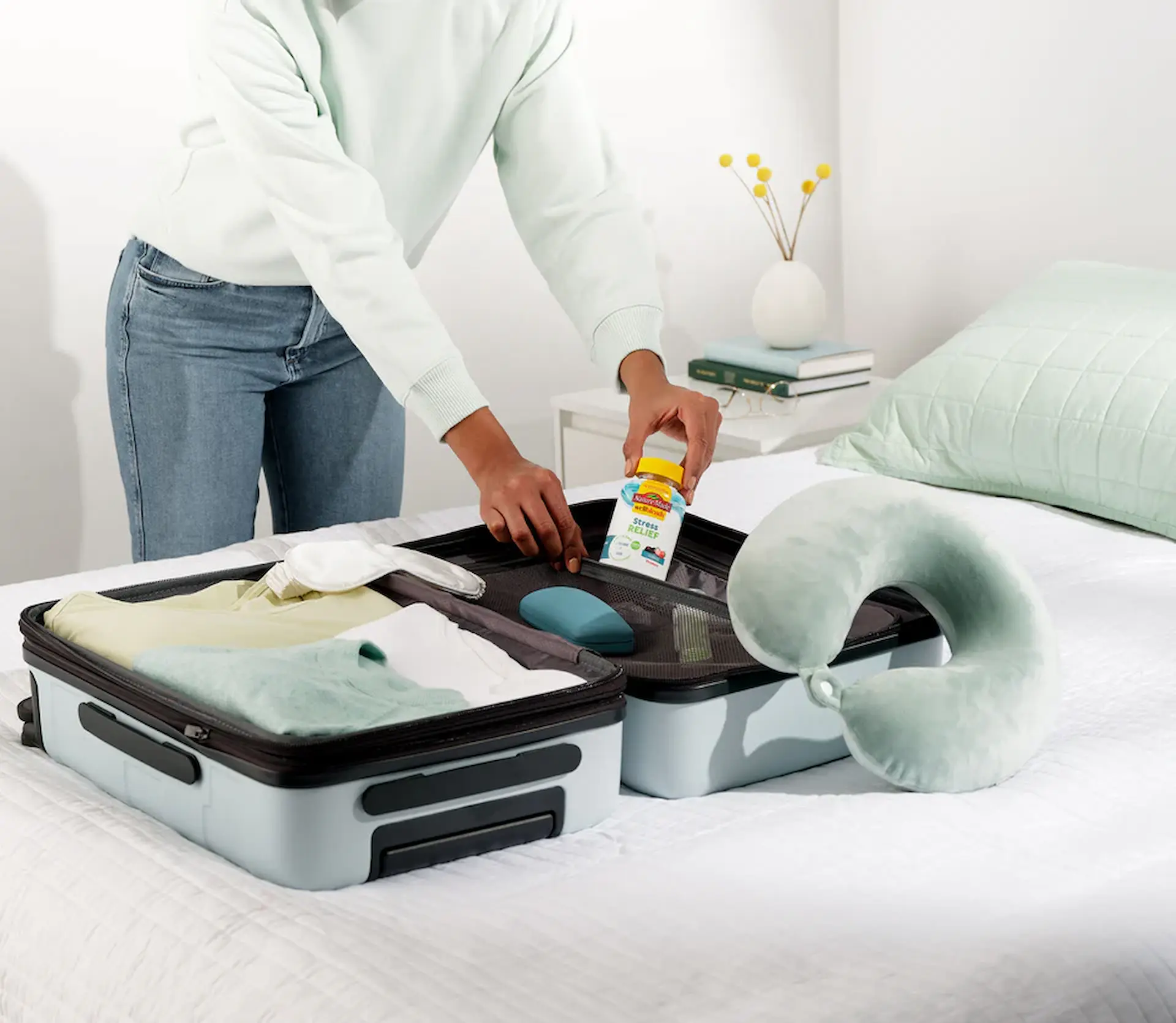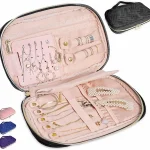If you travel internationally with a daily supplement routine, you already know how easily vitamins can become a packing dilemma. You don’t want to arrive without them, but you also don’t want to hold up a TSA line or run into problems at customs. The rules aren’t always crystal clear, and policies can vary widely from one country to another.
Here’s the good news: yes, you can bring vitamins on international flights, and TSA does allow most supplement formats in your carry-on or checked luggage, if you pack them correctly.
This guide will show you how to avoid unnecessary delays, prevent confiscations, and keep your vitamins safe and legal from departure to arrival.
Are You Allowed to Bring Vitamins Through TSA?
The Transportation Security Administration (TSA) permits most types of vitamins in both carry-on and checked baggage. You’re allowed to bring:
- Pills, capsules, and softgels
- Powdered supplements (under certain limits)
- Gummies and chewables
- Liquid vitamins, subject to volume rules
Solid vitamins (pills and capsules) are the easiest to travel with. They’re not restricted by volume, don’t need to be placed in your liquids bag, and don’t have to be in their original containers, though labeling helps.
If you’re bringing liquid vitamins, they fall under the TSA 3-1-1 rule for carry-on items. That means:
- Each container must be 3.4 oz (100 mL) or less
- All containers must fit in one quart-sized transparent bag
- You may be asked to remove the bag during screening
You do not need to declare vitamins at security unless they’re in liquid form exceeding the allowed amount or part of medically necessary supplements, in which case you can request additional screening.
What’s the Best Way to Pack Vitamins in Your Carry-On?
Your goal is to make your supplements easy to inspect and identify. You have two primary options:
- Original labeled bottles: This is the most foolproof approach, especially when traveling internationally. The manufacturer’s label clearly states ingredients, dosage, and brand, all of which can satisfy TSA or customs agents if questioned.
- Travel pill organizers or daily pouches: These are convenient, but they’re unlabeled. If you go this route, it’s smart to pack a printed list of your supplements, ideally including brand names, ingredients, and reasons for use (especially for prescription-only compounds in some countries).
If you’re packing gummies or powders, keep them in sealed containers and avoid large, unlabeled bags. White or colored powders in plastic bags, even if innocent, can attract attention. Store them in their original packaging or airtight supplement jars with printed labels.
For security, pack all vitamins in an accessible pocket of your carry-on, so you can remove them quickly if asked.
Can You Bring Vitamins in Checked Luggage?
Yes, you can pack vitamins in checked luggage, and in many cases, that’s the better option for larger quantities or less frequently used supplements. There are no quantity limits on solid vitamins in checked bags, but you should consider a few key points:
- Loss or damage risk: Checked bags can be delayed, mishandled, or lost. Never store medically necessary supplements or expensive custom blends in checked baggage.
- Temperature sensitivity: Airplane cargo holds aren’t temperature controlled. Some supplements degrade in heat or humidity. If your vitamins contain probiotics, enzymes, or omega-3 oils, check their storage requirements.
- Spill protection: Use durable containers and place them inside sealed zip bags or dry sacks to prevent supplement leaks from affecting your clothes or electronics.
When in doubt, split your vitamins between carry-on and checked bags to minimize loss or damage while staying compliant.
How Do International Customs Regulations Affect Vitamin Packing?
What’s legal to carry on the plane may not be legal to bring into your destination. Countries have different laws on vitamins, herbal supplements, and over-the-counter compounds.
For example:
- Japan has strict limits on pseudoephedrine and even some herbal ingredients.
- United Arab Emirates (UAE) bans certain hormone-related supplements and requires prescriptions for melatonin.
- Australia allows most vitamins but may require a prescription or import declaration for therapeutic-strength supplements.
Before you fly, research the supplement laws for the country you’re visiting. You can check with:
- The country’s embassy or consulate
- Customs and border control websites
- Airlines, which often post guidance for common destinations
If you’re bringing prescription supplements or restricted ingredients, carry a doctor’s note or a printed prescription. It helps if your vitamins are clearly labeled and in original packaging with dosage instructions.
Some countries require you to declare supplements at customs, especially if you’re carrying large quantities. Failing to declare items, even legal ones, can lead to confiscation or fines.
How Should You Store Vitamins While Traveling?
Once you’re past security, storage becomes about preserving quality and convenience.
Here’s what works best:
- Keep supplements in dry, sealed containers. Moisture and air are the two biggest enemies of supplement integrity.
- Use a hard-shell pill organizer or compact travel case to prevent crushing or spillage.
- If you’re traveling through hot climates, avoid leaving vitamins in parked cars or direct sunlight. For probiotics or temperature-sensitive formulas, use an insulated pouch with a cold pack and check product-specific temperature thresholds.
- For long-haul flights or stopovers, store your daily-use vitamins in your personal item for easy access and to avoid disruption in your routine.
What Are the Most Travel-Friendly Vitamin Formats?
All formats can travel, but some perform better than others:
- Tablets and capsules are the most travel-stable. They’re compact, don’t melt, and last longer.
- Powders are light and portable, but they require water and are more likely to trigger inspection, especially in unmarked bags.
- Gummies are convenient but prone to melting in warm weather. Keep them sealed and in a cool place.
- Liquids are effective but restricted by volume rules, making them better suited for checked luggage unless you’re carrying travel-size bottles.
Some brands like Care/of, Persona, and Rootine offer daily-dose vitamin packs, which are ideal for travel. They’re labeled, pre-dosed, and fit easily into your carry-on without bulk.
Tips to Avoid Airport and Customs Issues with Supplements
If you want a smooth security process, follow these expert-approved best practices:
- Label everything clearly, especially if you’re not using original bottles
- Avoid loose powders or unlabeled containers in your carry-on
- Keep liquids under 3.4 oz and place them in your TSA liquids bag
- Separate vitamins from prescription medication for faster screening
- Carry a supplement list or prescription printout, especially when traveling to strict countries
- Don’t bring excessive quantities unless you can prove personal use (e.g., 3-month supply max)
Being transparent and organized at checkpoints reduces the chance of inspection or misunderstanding.
FAQ: Traveling With Vitamins
Can I bring daily pill packets on a plane?
Yes. Pre-portioned daily packs are allowed. Labeling helps, especially for international travel.
Do vitamins count toward liquid limits?
Only liquid supplements are subject to the TSA’s 3-1-1 liquid rule. Pills, capsules, and powders do not.
Can I bring vitamins into the EU, UK, Australia, or Canada?
In most cases, yes, especially personal-use quantities of common vitamins. But rules vary by supplement strength and ingredient.
What should I do if customs question my supplements?
Stay calm. Show original packaging, printed documentation, and any prescriptions if applicable. Be honest about quantity and usage. Most travelers are cleared with proper documentation.





